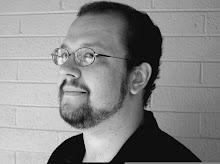1) The members of Alarm Will Sound who also arranged the works for the ensemble did a wonderful job, especially the arrangements of Revolution 9 and Luciano Berio's O King. It's one of the most engaging things about the group-- when I first heard their acoustic performances of Aphex Twin (!) on the album Acoustica, I had to keep checking that there weren't any electronics being used. That having been said...
2) You had to arrange O King?! It's a Pierrot-ensemble piece. You've got the people onstage to do the original as it stands. Why arrange?
3) I was surprised by how different the two halves of the program felt. Both worked, but the first half felt a little expository and just shy of cheesy-- probably unavoidable, but at intermission I was thinking, "I hope that this all gets tied together somehow." Happily, it did, and then some.
4) There really isn't any good way to handle the Berio character, is there? He needs to be there because of O King and Sinfonia, but many of his interjections felt extraneous or interruptive. You could cut out his pieces, but the whole show suffers badly without O King, and if the piece stays in, then we need to find out about the person who wrote it. Basically, it's the least awkward solution, and not-awkward might be as good as it gets.
5) Percussionist Payton MacDonald (as stuffy NY Times music critic Harold Schonberg) was hilarious, and played an awesome show.
6) I got to see the show with my good friend and fellow Banglewood alum Laura Sinclair, who's wrapping up her MM at the Cleveland Institute of Music-- it was great to see her and catch up on the last couple years.
I'm in Phoenix all week for spring break, and the coffee (at Cartel Coffee Lab) and weather are wonderful. Cheers.




No comments:
Post a Comment